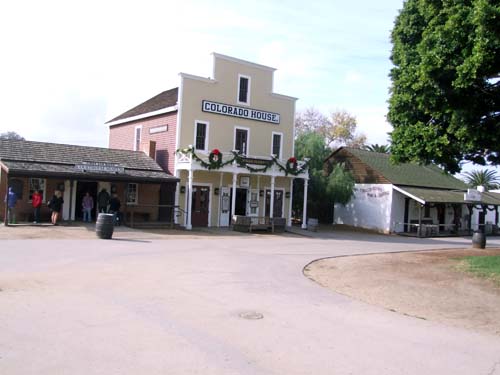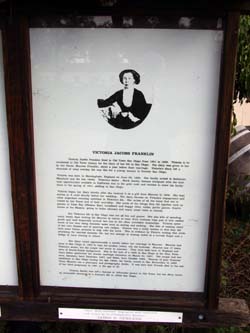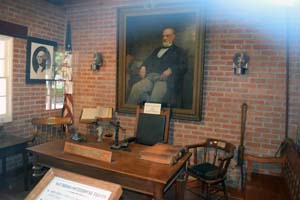
– Eleventh in a Series–
Exit 3, Taylor Street, San Diego~Courthouse, Old Town San Diego State Historic Park
By Donald H. Harrison

SAN DIEGO – There were no televisions, radios, motion pictures, or YouTube videos back in the mid 19th century. There were, occasionally, traveling stage productions and these were well-attended. But for day-to-day entertainment, San Diego citizens often crowded the town’s small brick courthouse to attend—and later comment upon—the proceedings.
If you look at the photograph above, you can see the courthouse on the left, as it appears today in Old Town San Diego State Historic Park. To the right of it is the Colorado House, and to the right of that is an empty lot. Back in the 19th Century, that lot was occupied by the Franklin House, which was the skyscraper of Old Town, being all of three stories tall.

The Franklin House was owned by Lewis Franklin, who played a prominent role in early California Jewish history, and his younger brother Maurice Franklin, both originally from England. Lewis traveled to San Francisco almost immediately after the discovery of gold near Sacramento in 1848, and it was in his tent in 1849 that the first Jewish High Holy Day services were conducted in San Francisco. The following year, Lewis, being learned in the Jewish religion, agreed to deliver the High Holy Day sermon. By 1851, however, Lewis moved to San Diego. There being insufficient Jews to make up a minyan, Franklin observed the holiday by meeting with three other Jews—the first Jewish religious meeting in San Diego’s history.
Two celebrated court cases in early San Diego history involved the Franklin House and its occupants. One of these cases became known throughout the United States as the “San Diego Incident.”
The first of these cases came in 1858 when the Franklin brothers started fighting with each other and things became so nasty that it resulted in the two brothers suing each other for a rightful division of the property.
In the trial, played out before a large audience of town people, it developed that the brothers’ relationship had soured after Maurice had married young Victoria Jacobs, whom latter-day San Diego historians remember chiefly for the fact that prior to her marriage she had kept a diary giving the flavor of day-to-day life in San Diego.
Lewis and Victoria did not like each other, witnesses testified, and matters became so bitter between them that Victoria refused to leave her room to go to the hotel dining room with her husband if she knew that Lewis would be there. Additionally, the brothers accused each other of shirking their duties at the hotel and in the ground-floor pharmacy which Maurice operated. Eventually, Circuit Court Benjamin Hayes dissolved the partnership and found that Lewis had suffered the greater financial damage. He ordered Maurice to pay his brother $1,111.64 ½ cents. Not long afterwards, Maurice and Victoria moved to San Bernardino, where Victoria died in 1861 at age 22, and was the first adult to be buried in the Home of Eternity, San Bernardino’s historic Jewish cemetery. Maurice lived on to 1875.

In 1859, one year after the Franklin vs. Franklin court case, San Diego County’s grand jury was meeting at the courthouse to consider a routine assault case. Hearing that Moses Mannasse had been a witness to the assault, the Grand Jury issued a subpoena for him to testify. Anxious to finish their business that Saturday, Oct. 8, rather than have to continue it to Monday, the Grand Jurors sent Deputy Sheriff Joseph Reiner to find Mannasse. He didn’t have to look too far, because Mannasse was with nine other Jewish men at Yom Kippur services being conducted two doors away at the Franklin House.
When Reiner delivered the subpoena, Mannasse declined to accompany him back to the Grand Jury proceedings. He explained that this was the holiest day of the Jewish year and that his presence was needed as the required tenth man to make a minyan.
Reiner told the Grand Jury what Mannasse said, but, unsympathetic to the Jew’s request, the jurors sent Reiner back to the Franklin House with orders to bring Mannasse back, by force if necessary. This he attempted to do, but Mannasse’s fellow Jews intervened, preventing Reiner from forcibly removing him. Finally, Reiner mobilized a posse to physically remove Mannasse and take him to the courthouse, where the Grand Jury awaited. While seated in the witness chair, Mannasse refused to answer any questions until after sunset when Yom Kippur had ended.
The San Diego Herald subsequently wrote that the Grand Jury had been “overanxious to conclude their labors before sunset, at the expense of the violation of conscience of a good citizen.” Franklin, meanwhile, considering the interruption of the services at his hotel to be possibly the worst insult suffered by the Jewish nation since the sacking of the Temple in 70 A.D., wrote indignant letters to Jewish newspapers around the country describing the incident.
“I know not what feeling mostly motivates me, in recapitulating to you the occurrences which have disgraced civilization in this our remote little town of San Diego,” he wrote. “Were I to say that unmitigated disgust fills my bosom, I would scarcely express myself as a wrong of the nature I shall here recount to you knows no parallel in the annals of the civilized world. An offense has been committed against all decency, and I, in common with my coreligionists, call upon you to give publicity to the matter so that the perpetrators may be marked with the rebuke of scorn by a free and independent press…”
Franklin’s letters prompted a debate among Jews throughout the country, with some agreeing with him, and others suggesting that it would not have been a major problem for the minyan to have simply recessed the Yom Kippur prayer session to allow Mannasse to do his civic duty.
When I have put the question to Jewish tour groups accompanying me through Old Town, I have found a similar division of opinion.
Next: Old Temple Beth Israel
*
Harrison is editor of San Diego Jewish World. You may comment to him at donald.harrison@sdjewishworld.com, or post your comment on this website provided that the rules below are observed.
__________________________________________________________________
Care to comment? We require the following information on any letter for publication: 1) Your full name 2) Your city and state (or country) of residence. Letters lacking such information will be automatically deleted. San Diego Jewish World is intended as a forum for the entire Jewish community, whatever your political leanings. Letters may be posted below provided they are responsive to the article that prompted them, and civil in their tone. Ad hominem attacks against any religion, country, gender, race, sexual orientation, or physical disability will not be considered for publication. There is a limit of one letter per writer on any given day.
__________________________________________________________________